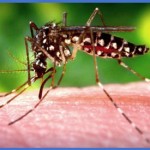
A Guyanese man who visited St. Lucia and returned to Guyana last week has died after he was suspected to have been infected by the Chikungunya virus during his St. Lucian visit.
Health Officials in St. Lucia are worried about the growing number of cases of the virus in the small island.
The 38-year-old man, Cardel Duncan, passed away on Sunday night at the St. Joseph Mercy Hospital in Georgetown where Doctors were battling to save his life.
A close friend of the man told News Source that the man’s lungs and other organs started to collapse and there was little more than the doctors could do. But his death came as a shock to relatives and friends. The dead man was the eldest son of veteran Trade Unionist, Carvil Duncan.
The older Duncan explained to News Source that his son returned from a short visit to St. Lucia and was very ill, so he got him admitted to the private hospital last week where tests were being done and he was being treated for his complaints.
Duncan said his son had no known previous ailment and was a very healthy young man who worked as a taxi driver and lived with the family at their Festival City home. He said when his son left for St. Lucia, he was healthy and had no medical complaints.
However, when he returned he complained of severe pains to his joints, fevers and headaches, which are all symptoms consistent with the Chikungunya virus. Mr. Duncan said the hospital would not confirm whether his son’s death was related to the virus possibly being in his system.
When contacted, officials of the Mercy Hospital said they could not release any details about the patient’s death or cause of death.
Chikungunya is a virus more commonly found in Africa and Asia. It is transmitted by the same daytime-biting aedes aegypti mosquito that causes the more deadly dengue fever. The first detection of the virus in the Caribbean took place five months ago in the Eastern Caribbean.
Guyana has recorded at least 12 confirmed cases of the virus and over 20 suspected cases in the Berbice region. The Health Ministry has launched an aggressive fogging exercise in the Berbice community in its efforts to attack the mosquitoes that carry the virus.
Local health officials have said the disease isn’t known for fatality, but can result in some long-term effects primarily joint pains. It usually causes moderate to severe illness. This period can last from two to six days with symptoms lasting four to seven days after infection.
An infected person may stand as a threat to others for up to 21 days after infection because the virus can be transferred within that period.
Officials have warned that fever management is critical in both children and elderly persons as they may stand at a higher risk of fatality if they contract the disease. The Health Ministry has explained that if an individual is experiencing any such symptoms that they avoid the use of aspirins because if the disease is associated with dengue it can lead to bleeding.











You must be logged in to post a comment Login